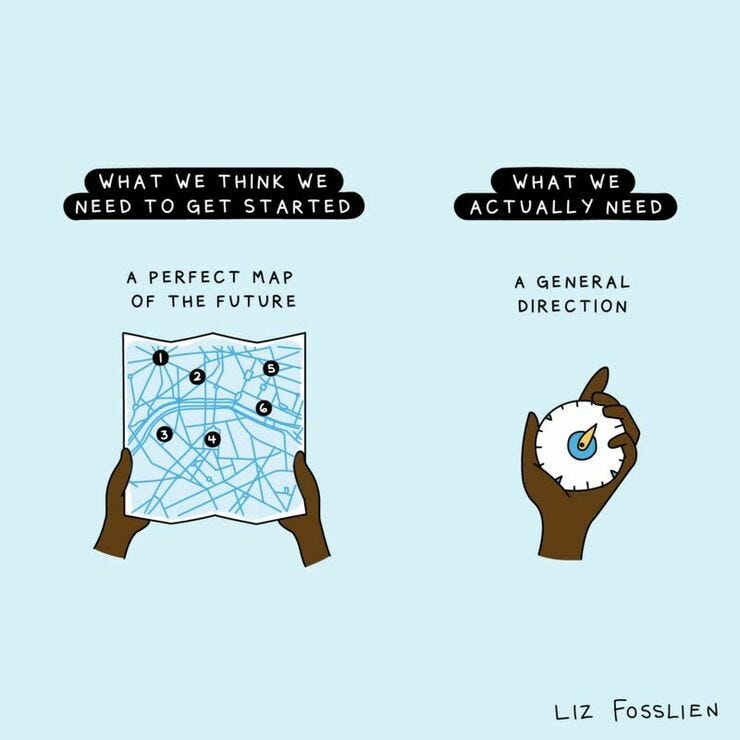The Intentional Organisation - Issue #34 - Intentional Actions and the War
1. Intentional Purposeful Actions
Already a month has passed since Russia initiated the invasion of Ukraine. As I have been busy working on the #HRForUkraine initiative, I have been struck by the amount of "corporate activism" that immediately started to show in streams of solidarity and direct actions unexpected.
We have seen several different actions overlapping:
Transparent Activism by CEOs, some not new to taking a stance on burning issues.
Political and Academic pressure, sometimes also linked to some shareholders on companies to act (an example is the role of prof. Jeffrey Sonnenfeld who has created the list at Yale University that is splitting companies into "good" and "bad" ones in taking a stance on Russia).
Consumer Activism, whereby consumer pressure groups demand actions, like in the case of Nestlè these days.
Employee Activism, whereby internal employees demand concrete actions, like in the case of Deloitte and under consulting companies.
In the US, this is underscored by a general tendency by the public to expect companies (and CEOs particularly) to take a stand on important policy issues. According to the 2022 Edelman Trust Barometer:
81% believe CEOs should be personally visible when discussing public policy with external stakeholders or their company's work to benefit society.
60% said that when considering a job, they expect the CEOs to speak out publicly about controversial social and political issues that the prospective employee cares about.
Some latecomers are also evaluating a robust reputational risk here, as the topic of the invasion of Russia did not go on the traditional division lines of western politics. Most companies have started to quickly think about the risks to their reputation were they to do nothing. With so many other companies pulling out, it likely seemed better to explain to shareholders and customers back home why they're leaving than why they're staying.
However, the question for me is how this links in with topics of Purpose and Intentionality that we have been discussing lately.
Purpose as a Guidance for Moral Dilemmas
The researcher in me feels compelled to call out that the actions of all of these companies underscore the normalization of stakeholder capitalism and the rise of organizational purpose.
This quote is by Stacia Garr, co-founder of RedThread Research. This company in 2020 issued interesting research on Purpose that underscores the necessity for a company to "publicly share purpose-based actions to normalize them".
Focusing on different stakeholders, in alignment with the Purpose and values of an organisation, is critical in moments of crisis such as the one we see now. But decisions are never easy or "black and white", especially in situations like the one we face. Leaders have faced Moral Dilemmas every day since the war started, each one requiring intentional action.
Let's see a few examples.
The situation is extraordinarily challenging for a global brand like ours, and there are many considerations. For 66 years, we have operated with the belief that communities are made better when there’s a McDonald's nearby
[…]
At the same time, our values mean we cannot ignore the needless human suffering unfolding in Ukraine. Years ago, when confronted with his own difficult decision, Fred Turner explained his approach quite simply: "Do the right thing." That philosophy is enshrined as one of our five guiding values, and there are countless examples over the years of McDonald's Corporation living up to Fred's simple ideal. Today is also one of those days. – Chris Kempczinski, CEO, McDonald's
This is how McDonald's CEO announced the closure of all McDonald's in Russia, a choice impacting more than 62.000 workers. Not easy, also because a significant portion of the stores is not operated directly but through franchising agreements, which has brought additional complexities. Some restaurants still reported opening two weeks after the decision. The closure is also underlined for its significance because it was one of the first openings to western lifestyles and has triggered immediate reactions by Russia's Duma.
Some companies have instead been taking a different decision, continuing to provide service to Russian customers, based still on assumptions linked to their Purpose and values. So it is the case of Cloudflare. Its CEO has written a long explanation.
Beyond this, we have received several calls to terminate all of Cloudflare's services inside Russia. We have carefully considered these requests and discussed them with government and civil society experts. Our conclusion, in consultation with those experts, is that Russia needs more Internet access, not less.
As the conflict has continued, we’ve seen a dramatic increase in requests from Russian networks to worldwide media, reflecting a desire by ordinary Russian citizens to see world news beyond that provided within Russia.
[...]
In fact, we believe the Russian government would celebrate us shutting down Cloudflare's services in Russia. We absolutely appreciate the spirit of many Ukrainians making requests across the tech sector for companies to terminate services in Russia. However, when what Cloudflare is fundamentally providing is a more open, private, and secure Internet, we believe that shutting down Cloudflare's services entirely in Russia would be a mistake. – Matthew Prince, Co-founder and CEO, Cloudflare
Two different choices, yet both rooted in strong cultural roots. Both also have tremendous ripple effects on the companies' ecosystem, another element to consider.
Which underlines the fact that there is rarely one and only "right thing to do". No straightforward answer. And that's the entire point of having a Purpose that is a compass for moral and ethical action. It shows a path but does not dictate choices outside of the relationship system with all of the stakeholders at play.
Thinking about Employees
Companies in the food, agricultural, consumer goods, pharma sector are adopting differentiated solutions depending on their product lines. Most have suspended advertising and investments. Many companies have stopped operations in Russia but based instead on supply chain shortages than on the company's "political" decision. I have been tracking over 450 companies with the #HRForUkraine database to underline the impact of these suspensions on more than 450,000 workers in Russia.
Many of the companies that have been less willing to take more robust measures, underlined this precisely in terms of their "duty of care" for the employees in the country.
Yet also here there is no single straightforward answer, and HR these days has to confront an environment where also taking fundamental decisions is difficult. Just to give you a glimpse of the complexity:
Companies are facing challenges in explaining to their employees in Russia why they are making certain choices. The current legal restrictions make it practically impossible to criticise Russian actions, which adds to the complexity of the situation.
Sharing news and content from the west poses the risk of exposing employees in Russia to inspections and risks.
Some companies have started relocating their employees out of Russia. But this is difficult, few routes are open out of Russian airports.
There are extensive limitations in financial transfers, also paying a basic salary is currently a problem.
In certain areas, closing factories could trigger the potential for some blue-collar workers to enrol in the Russian army.
And these are just a few issues that are arising, all needing an answer in terms of intentional action.
Business Model Congruence
This situation has exposed, however, also another interesting aspect. Many business models have not been adapted to choices companies have made in terms of values, purpose and corporate sustainability. Marks & Spencer is an extraordinarily interesting case in this respect. A company deeply rooted in British history, with an ambitious sustainability agenda. Yet, despite its initial announcements of support, the company has been unable to close the Marks & Spencer stores in Russia, because they operate through a franchise agreement with a Turkish company.
The same is happening for many hotel chains, such as Marriott, and Yum Brands Burger King is facing the same difficulty.
These are perfect examples of choices that created Organisational Debt with far-reaching effects. If you set a Purpose for your brand, you need to be able to enact that purpose in every place where that brand is hanging. Seems such a simple idea, yet often not easily practised.
Conclusion
This new situation is bringing a lot of learning of what worked well with globalisation, and what instead didn't. Many corporations are paying important tolls for their past choices, but some are also rapidly adapting.
Yet, we should not forget that this learning is coming against the back of the worst humanitarian disasters of this century. A war intentionally initiated by an autocratic government, with an increasing amount of unintentional consequences.
Let's continue to approach all these moral dilemmas we are facing, keeping in mind the most important value of it all: our humanity.
Sergio
Cover Photo by SOULSANA on Unsplash
2. My Latest Posts
3. Reading Suggestions
Daydreaming, promenading and zoning out pay rich dividends
4. The (un) Intentional Organisation
Source: Liz Fosslien Linkedin
5. Keeping in Touch
Don’t hesitate to reach out, either by hitting “reply” to this newsletter directly or using my blog’s contact form.
I welcome any feedback, both on this newsletter and, in general, on the content of my articles.
Find me also on:




